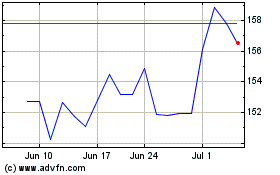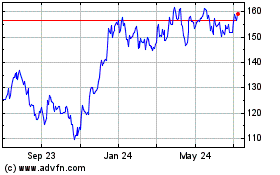4th UPDATE: JP Morgan Leads Banks Set To Raise Dividends After Stress Test
March 13 2012 - 9:17PM
Dow Jones News
J.P. Morgan Chase & Co. (JPM) led a number of the biggest
U.S. banks in announcing dividend raises and stock buybacks, after
receiving the results of the Federal Reserve's stress tests.
The Fed said 15 out of 19 banks maintained healthy capital
levels in the stress-test scenario. Four firms, including Citigroup
(C), SunTrust Banks Inc. (STI), MetLife Inc. (MET) and Ally
Financial (GMA.XX), failed to meet at least one of the capital
requirements under the hypothetical stress scenario. Ally trailed
the guidelines with Tier One capital below 5% in the test.
Many banks were expected to raise dividends and increase share
buybacks four years after the financial crisis as capital levels
have improved and losses from bad loans continued to abate. The Fed
said its test was "deliberately stringent," but strong capital
levels "are critical to ensuring that banking organizations have
the ability to lend and to continue to meet their financial
obligations, even in times of economic difficulty."
Citi said in a statement the Fed objected to its plan to return
capital to shareholders, though it had no objection to its current
dividend levels on preferred and common stock. The bank said it
will submit a revised capital plan to the Fed later this year. The
bank also said it exceeded the stress test requirements without its
planned dividend increase.
Fifth Third Bancorp (FITB) said the Fed objected to parts of its
capital plan, namely a dividend increase. The bank can buy back
common stock, but only as much as the after-tax gains from the sale
of Vantiv Inc. shares. The Cincinnati bank owns 49% of Vantiv, a
payment processing firm; Vantiv has plans to go public.
The test shows that SunTrust has sufficient capital only if it
doesn't increase the dividend or buy back common stock, and the
Atlanta bank said, as a result, it "will not be increasing its
return of capital to shareholders at this time."
MetLife, the only insurer included in the program, said in a
statement it was "deeply disappointed" with the Fed's analysis, and
said the "bank-centric methodologies" of the stress test don't
properly evaluate the financial strength of a life insurer, which
operates under a different business model.
Ally Financial, majority owned by the U.S. government, said the
Fed's assumptions in its test were "inconsistent" with its own
views and "dramatically overstates potential contingent mortgage
risk." Ally plans to submit a revised capital plan in the near
future, the company said.
Of the banks that maintained healthy capital levels in the
stress test, Bank of America (BAC) didn't seek to raise dividends
or a new buyback authorization.
Capital One Financial Corp. (COF) didn't ask for a dividend
increase or share buyback because it recently announced two
acquisitions and plans to raise capital tied to the deals. The bank
remains comfortable with its capital levels, a spokeswoman
said.
Morgan Stanley (MS) said Tuesday it received no objection from
the Fed for its 2012 capital plan, including the potential cash
acquisition of an additional 14% of Morgan Stanley Smith Barney and
ongoing payment of current common and preferred dividends. Goldman
Sachs Group Inc. (GS), meanwhile, said it got no objections to
plans to repurchase unspecified amounts of stock and potentially
raise its dividend.
U.S. Bancorp (USB) boosted its dividend by 56%, and PNC
Financial Corp. (PNC) said it passed the stress test, according to
a person familiar with the matter. BB&T Corp. (BBT) said the
Fed had no objection to it raising its dividend by 4 cents.
Keycorp (KEY) said it will buy back $344 million in stock and
said its board will evaluate an increase in the dividend and make a
decision on that in May.
Bank of New York Mellon Corp. (BK) also said the Fed had no
objections to its plans to buy back $1.16 billion of stock. Wells
Fargo & Co. (WFC) raised its dividend to 22 cents retroactively
to the first quarter.
American Express Co. (AXP) plans to buy back $4 billion of
shares; it also may increase its quarterly dividend to 20 cents
from 18 percent.
The Fed had planned to release the results of this year's
Comprehensive Capital Analysis and Review, or stress tests, on
Thursday afternoon. It decided to move up the timing to Tuesday
afternoon.
The tests look at how the 19 biggest U.S. banks would fare in a
severe downturn, including an unemployment rate of 13%, a 21%
decline in housing prices and a 50% drop in equity prices.
Of the 19 banks subject to this year's test, Regions Financial
Corp. (RF) is the only one left that hasn't repaid funds received
under the Troubled Asset Relief Program, the crisis-year emergency
fund used to shore up bank capital levels.
Regions said Tuesday it would raise $900 million in common stock
to pay $3.5 billion in TARP funds.
Bank stocks jumped in afternoon trading on the stress test
results. J.P. Morgan's shares surged 7.03%, to $43.43 and Bank of
America shares rose 6.26%, to $8.49. Morgan Stanley rose 4% to
$18.93. U.S. Bank rose 4.8%, to $31.01, while PNC rose 4.1%, to
$61.94. BB&T rose 3.7% to $30.40. But some fell in after market
trading, particularly Citi and SunTrust, which fell 3.21% and
3.68%, respectively.
-By Liz Moyer, Dow Jones Newswires; 212-416-2512;
liz.moyer@dowjones.com
--Dan Fitzpatrick, Brett Philbin, Erik Holm and Andrew Johnson
contributed to this report.
PNC Financial Services (NYSE:PNC)
Historical Stock Chart
From May 2024 to Jun 2024

PNC Financial Services (NYSE:PNC)
Historical Stock Chart
From Jun 2023 to Jun 2024
